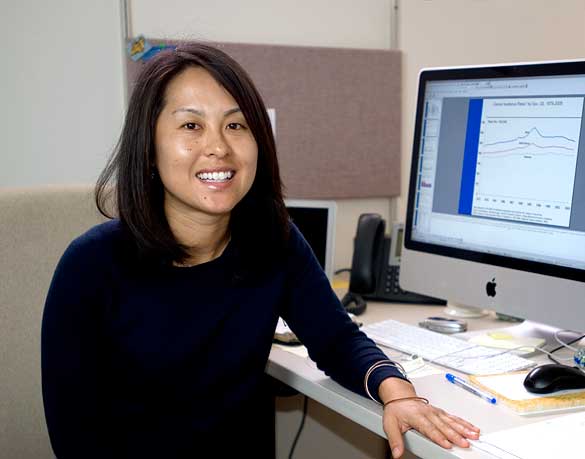Unraveling genetic clues to prostate cancer
April 20th, 2010 | by Cheryl Ernst | Published in April 2010

Prostate cancer is a pervasive disease, present to some degree in most men by the time they die although rarely fatal in its less aggressive forms.
The risk and prognosis varies by ethnicity. African Americans have a higher incidence and at least twice the mortality rate compared to other racial/ethnic groups; Japanese Americans have the lowest incidence.
Related Stories
Using the Human Genome Project, previous studies have pointed to regions within the human genome that appear to be linked to development of prostate cancer.
Now Cancer Research Center of Hawaiʻi Assistant Professor Iona Cheng is trying to “tease apart” the genetic code, looking for the specific variations involved in increased risk for developing the disease.
The California raised, Yale and University of Southern California trained epidemiologist is looking specifically at the Insulin-like Growth Factor 1, or IGF1 gene. The gene directs production of a hormone similar to insulin that plays a role in cell growth and cell death. “Higher circulating levels of 1IF1 have been correlated with an increased risk of prostate cancer,” Cheng says.
She and her colleagues previously linked inherited differences at the 1IF1 gene to prostate cancer risk, but the specific genetic variants responsible have yet to be identified.
Part of what attracted Cheng to come to the University of Hawaiʻi after completing postdoctoral work at the University of California, San Francisco was to work with data from the large, long-running Multiethnic Cohort Study.
The cohort includes 215,000 men and women of Caucasian, African, Latin, Japanese and Native Hawaiian descent living in Los Angeles and Hawaiʻi. Tracked since they were enrolled at ages 45-75 in 1993, participants have provide genetic and biological samples and completed extensive questionnaires. CRCH’s Laurence Kolonel serves as principal investigator on the study; Epidemiology Program Director Loic LeMarchand uses the data to investigate interaction between genetic and lifestyle factors.
Cheng pores over the data, filtering out the “noise” and zeroing in on specific genetic variations linked to prostate cancer development as well as looking at clues provided by laboratory work linking genetic variations to cell functions.
A better understanding the genetic role in prostate cancer has multiple benefits, she says. Research could establish markers to identify those at increased risk, for example, suggesting when screening tests are warranted and who should adopt preventive measures. And, understanding the genetic-based biology of the disease mechanism also helps in developing drugs to target the specific chain of events that leads to a certain kind of cancer, Cheng adds.
Cheng’s work on 1IF1 is supported by a $200,000, two-year V Scholar award from the Jim Valvano Foundation for Cancer Research. In collaboration with the multi-institutional prostate cancer research program CaP Genes, she has also investigated genetic variants in the innate immunity and inflammation pathway for their role in aggressive prostate cancer.
Under another grant (nearly $2 million over four years from the National Cancer Institute), Cheng is working to characterize differences in the mitochondrial genome and investigate its influence on risk for breast, prostate and colorectal cancer.
Tags: cancer, Cancer Research Center of Hawaii, UH Manoa, Vol. 35 No. 1
